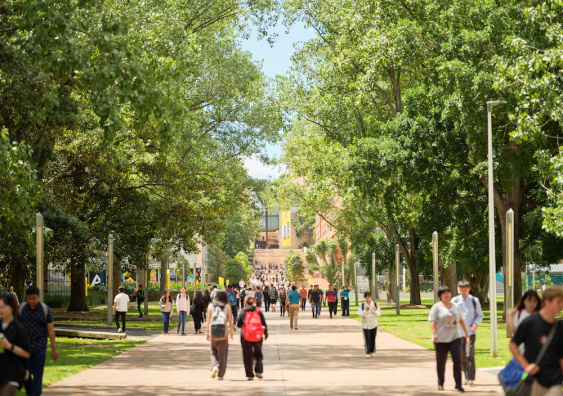University Of New South Wales shines in 2023 Times Higher Education Impact Rankings
UNSW Sydney has extended its meteoric rise in the Times Higher Education (THE) Impact Rankings, jumping 37 places to equal 18th place globally in the 2023 edition.
Among the highlights, the University rose to second in the world for SDG 13 – Climate Action, spearheading the institution’s move into the global top 20. UNSW also moved up five places overall to 5th in Australia, making UNSW the top-ranked Group of Eight university on the table.
A record 1591 institutions from 112 countries/regions participated in the latest rankings.
It is the University’s best result in the Impact Rankings, which are the first global attempt to measure university progress around Sustainable Development Goals (SDGs) adopted by all United Nations states. UNSW ranked 55th in 2022 and 96th in 2021, representing a 78-spot improvement over the last three years.
UNSW Vice-Chancellor and President Professor Attila Brungs said the continued rise in the Impact Rankings is evidence of the University’s commitment to effecting global change.
“UNSW has a proud history of expertise and action in climate science, sustainability and addressing global development challenges. We are committed to advancing the Sustainable Development Goals and embedding ‘SDG Thinking’ throughout the University,” Prof. Brungs said.
“These results reflect our ambition to be a catalyst for a sustainable, more equitable future through collaborative research, partnership and innovation, and ultimately, to improve lives in Australia and across the globe.”
UNSW ranks 2nd in the world for Climate Action
The rankings measure an institution’s research, outreach and stewardship against the 17 SDGs. The goals encompass strategies to improve health and education, improve inequality, and spur economic growth while tackling climate change and preserving our natural environment.
THE calculates a university’s Overall Ranking score by combining its score in SDG 17 Partnerships for the Goals (=21st; 6th in Australia), with the scaled scores for its top three SDGs. The score for the overall ranking is an average of the current and previous year’s total scores.
UNSW secured 10 top 100 spots, including three in the global top 10. Its three strongest performing areas are:
SDG 11 Sustainable Cities and Communities (9th; 4th in Australia)
SDG 13 Climate Action (2nd; 2nd in Australia)
SDG 15 Life on Land (10th; 3rd in Australia).
The University earned high marks in its top-ranked Goal – SDG 13 Climate Action – for its commitment to being a carbon-neutral university.
This was driven by UNSW achieving net zero operational emissions in 2020 through investment in energy efficiency, onsite and offsite renewable energy and carbon offsets. UNSW is also targeting net zero value chain emissions including supply chain, travel, investments, commuting and other sources, by 2050 and a 50 per cent reduction by 2030.
“Our Environmental Sustainability Plan 2022-24 is especially focused on action that contributes to SDG7, SDG12 and SDG13, so it’s fantastic that we were ranked highly for these SDGs. We are particularly pleased to be ranked 2nd for SDG13 – Climate Action – reflecting our switch to renewable electricity, and commitment to achieving net zero emissions,” said William Syddall, Head of Environmental Sustainability at UNSW.
“Estate Management will continue this work in 2023 by implementing our Electrification Strategy, engaging with our supply chain to tackle emissions, and expanding LEAF, our laboratory sustainability program.”
For SDG 11, UNSW’s commitment to sustainable practices for new and refurbished buildings, for example, the new UNSW Randwick Campus redevelopment scheme with the Integrated Acute Services Building and Health Translation Hub, contributed to its score of 98.8 out of 100.
UNSW’s support of housing affordability for students and staff in 2021 through accommodation scholarships, subsidised student accommodation for low-income and students in financial difficulty through the Covid relief package, and the staff hardship fund, also helped boost the score.
The University moved up 62 places to 10th in the world for SDG 15 – Life on Land (3rd in Australia). UNSW scored full points for its activities supporting land ecosystems through education and action, including the post-fire recovery of threatened ecological communities project led by the UNSW Centre for Ecosystem Science.
A collective effort
Since 2020, UNSW has hosted the secretariat for the International Universities Climate Alliance (IUCA), with members from 25 countries, contributing to UNSW’s performance in climate science, partnerships and climate change action metrics across the rankings.
Professor Rita Henderson, Chair of the UNSW SDGs Steering Committee and Associate Dean Equity and Diversity in the Faculty of Engineering said: “Our success in the THE Impact Rankings is a testament to the passion and dedication the collective University community has in contributing to achieving the SDGs.
“It is wonderful to see the efforts of everyone involved, across our University operations, research and teaching, and student activities, recognised in these latest results.”
UNSW’s remaining six SDGs ranked in the global top 100 and are:
SDG 2 No Poverty (51st; 3rd in Australia)
SDG 6 Clean Water and Sanitation (37th; 7th in Australia)
SDG 7 Affordable and Clean Energy (36th; 4th in Australia)
SDG 9 Industry, Innovation, and Infrastructure (50th; 1st in Australia)
SDG 12 Responsible Consumption and Production (25th; 3rd in Australia)
SDG 14 Life Below Water (24th; 5th in Australia).

